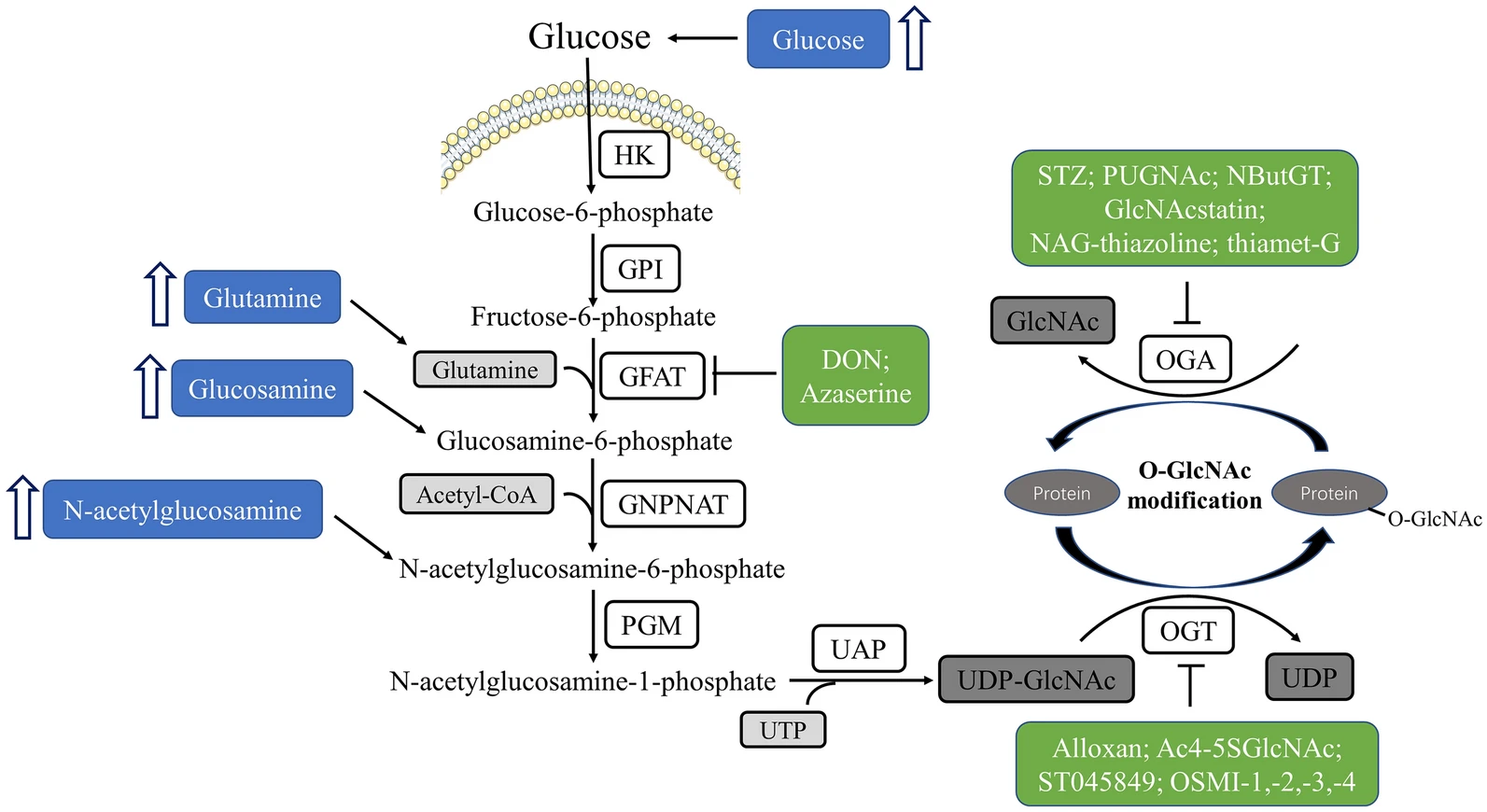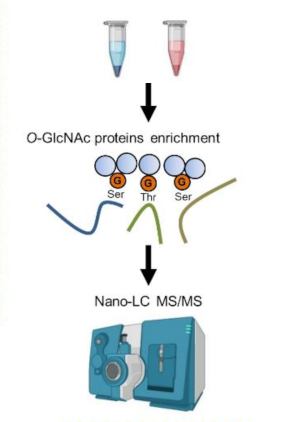O-GlcNAcylation Profiling Service
O-GlcNAcylation Profiling Service is a high-throughput protein post-translational modification analysis service based on mass spectrometry and selective enrichment strategies. It is designed to systematically identify and quantitatively analyze O-GlcNAc modifications on proteins. This service employs specific enrichment of O-GlcNAc-modified peptides, stabilization techniques, enzymatic digestion, and mass spectrometric detection to comprehensively profile the dynamic changes and distribution patterns of O-GlcNAc modifications in target samples.

Xue Q. et al. Eur J Med Res. 2024.
Protein O-GlcNAcylation (O-linked β-N-acetylglucosaminylation) is a dynamic and reversible post-translational modification (PTM) that occurs in the nucleus, cytoplasm, and even mitochondria. It involves the covalent attachment of an N-acetylglucosamine moiety to the hydroxyl group of serine (Ser) or threonine (Thr) residues. This modification is catalyzed by O-GlcNAc transferase (OGT) and removed by O-GlcNAcase (OGA). O-GlcNAcylation often exhibits competitive or cooperative interactions with other PTMs, such as phosphorylation and acetylation, and plays critical roles in intracellular signaling, epigenetic regulation, stress response, and metabolic control. Dysregulation of O-GlcNAcylation is closely associated with various human diseases, including cancer, diabetes, neurodegenerative disorders, and cardiovascular diseases. Therefore, comprehensive, quantitative, and high-throughput analysis of this modification is crucial for studying disease mechanisms and identifying novel drug targets.
Leveraging high-resolution mass spectrometry, advanced enrichment techniques, and robust bioinformatics platforms, MtoZ Biolabs provides O-GlcNAcylation Profiling Service to sensitively identify and quantify O-GlcNAc-modified proteins and their specific modification sites, supporting systematic elucidation of O-GlcNAc’s functional roles in cellular signaling, metabolic regulation, and disease pathogenesis, enabling deeper insights into target discovery and mechanistic research.
Analysis Workflow

Lin CH. et al. Cancers. 2022.
The main workflow of O-GlcNAcylation Profiling Service:
1. Sample Preparation
Proteins are extracted from the sample, followed by denaturation, reduction, alkylation, and enzymatic digestion.
2. Enrichment of O-GlcNAc-Modified Proteins/Peptides
Specific enrichment of O-GlcNAc-modified proteins or peptides is performed using techniques such as immunoprecipitation with anti-O-GlcNAc antibodies.
3. Liquid Chromatography–Mass Spectrometry (LC-MS) Analysis
Enriched samples are analyzed using nano-flow liquid chromatography coupled with high-resolution mass spectrometry to ensure sensitive and accurate detection.
4. Bioinformatics Analysis
Modification sites are mapped, and functional annotation and pathway enrichment analysis are conducted using databases such as GO and KEGG.
Service Advantages
1. Advanced Analysis Platform: MtoZ Biolabs established an advanced O-GlcNAcylation Profiling Service platform, guaranteeing reliable, fast, and highly accurate analysis service.
2. One-Time-Charge: Our pricing is transparent, no hidden fees or additional costs.
3. High-Data-Quality: Deep data coverage with strict data quality control. AI-powered bioinformatics platform integrates all O-GlcNAcylation Profiling Service data, providing clients with a comprehensive data report.
4. High Sensitivity and Specificity: By integrating high-resolution mass spectrometry with specific enrichment strategies, our service enables precise capture and identification of low-abundance O-GlcNAc-modified peptides.
Sample Submission Suggestions

It is recommended to avoid using lysis buffers containing high concentrations of detergents or alcohols to ensure optimal enrichment and detection efficiency.
You are welcome to communicate your specific needs with the MtoZ Biolabs technical team before submitting your samples. We can provide customized sample processing suggestions and pre-treatment services.
Applications
MtoZ Biolabs' O-GlcNAcylation Profiling Service supports a wide range of research areas, including:
Disease Mechanism Elucidation
Investigating the regulatory roles of O-GlcNAc modifications in conditions such as diabetes, cancer, and Alzheimer's disease.
PTM Crosstalk Analysis
Uncovering the interplay between O-GlcNAcylation and other modifications, such as phosphorylation.
Drug Target Discovery
Identifying disease-associated O-GlcNAc biomarkers and potential therapeutic targets.
Signal Pathway Exploration
Profiling the dynamic expression and functional roles of modified proteins within key signaling pathways.
Stress and Environmental Response
Monitoring O-GlcNAc modification trends under stress, metabolic challenge, and other environmental stimuli.
Deliverables
1. Comprehensive Experimental Details
2. Materials, Instruments, and Methods
3. Total Ion Chromatogram & Quality Control Assessment (project-dependent)
4. Data Analysis, Preprocessing, and Estimation (project-dependent)
5. Bioinformatics Analysis
6. Raw Data Files
Related Services
Post-Translational Modifications Proteomics Service
Deamidation Proteomics Service
Adenylylation Proteomics Service
How to order?







